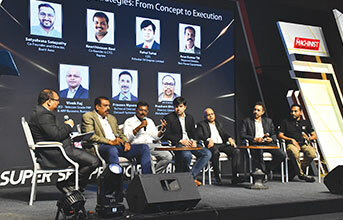
The ETNOW Tech in Manufacturing Summit's second edition featured an engaging panel discussion on Smart Manufacturing Strategies: From Concept to Execution. The panel included Arun Kumar TM, Regional Director of Best Power Equipments; Keerthivasan Ravi, Co-Founder & CTO of Raptee; Praveen Mysore, Technical Director of Dassault Systèmes; Rahul Sahai, CEO of Kirloskar Oil Engines Limited; Satyabrata Satapathy, Co-Founder and Director of BonV Aero; and Vivek Raj, CEO of Telecom Grade FRP & ARP Business at Runaya. The power-packed discussed smart manufacturing concepts, exploring strategies for implementation, integration, and optimisation across the entire manufacturing value chain.
Moderated by Prashant Bhingardeo, Director - Operations & Manufacturing Consulting at PwC India, the discussion began with Bhingardeo asking about the current and future outlook of smart manufacturing in India.
Arun Kumar started the discussion by pointing out that India is rapidly progressing in digital transformation, especially in the manufacturing sector. He mentioned that technologies such as IoT, data analytics, and artificial intelligence are driving efficient manufacturing. These technologies are crucial for the industry today, with significant investments flowing into various sectors, including automotive.
Kumar emphasised that the future of the industry depends on these investments. He highlighted that "India's GDP contribution from manufacturing is expected to increase from 17 per cent to 21 per cent by 2025." However, he also pointed out the challenges that need to be addressed, including the requirement for a skilled workforce, substantial investments, and effective strategies to drive this transformation. He concluded that "there is enormous growth potential as traditional manufacturing shifts towards digitisation and smart manufacturing."
Bhingardeo then directed a question to Rahul Sahai, asking him about the business benefits organisations should aim for when adopting smart manufacturing strategies. Sahai emphasised the importance of predictability in manufacturing operations, particularly in discrete manufacturing. He mentioned that the primary goal is ensuring manufacturing operations align with the planned outcomes.
Sahai shared an example from his own experience. His team designed a new technology by creating digital twins and installing sensors in every machining centre. This setup enabled real-time monitoring and interaction with the manufacturing unit, leading to improved planning and predictability of outcomes. Sahai emphasised that smart manufacturing's primary goal is to enhance predictability in manufacturing processes.
Adding to Sahai's point of view, Kumar too shared an example from his company, which manufactures UPS systems. He explained how they had incorporated IoT into their UPS units, enabling remote monitoring of the systems' health via smartphones. This innovation allowed for cost-effective maintenance and improved efficiency, demonstrating the practical benefits of smart manufacturing.
Satyabrata Satapathy discussed how smart manufacturing strategies are transforming logistics and transportation. He highlighted the use of logistic drones designed for challenging terrains, digital twin technology, automation, and IoT-based systems to streamline production and ensure precision and efficiency.
Praveen Mysore discussed how these strategies are transforming product design to product lifecycle in manufacturing. He emphasised the evolution of smart manufacturing technology, which has significantly reduced the time required to design and develop products, such as passenger cars. He explained that concurrent engineering allows for simultaneous design and manufacturing activities, breaking down silos between different functions and enabling virtual simulations before physical implementation. This approach increases confidence, reduces non-value[1]added activities, and enhances overall efficiency.
When discussing the implementation of smart manufacturing strategies, whether through pilots or full-scale implementation, Vivek Raj advocated starting with pilot projects to minimise risks and evaluate different configurations before scaling up. He shared Runaya's experience of validating solutions on a smaller scale before implementing them across multiple sites.
Continuing the discussion on challenges and barriers, Keerthivasan highlighted the typical challenges faced during implementation. He shared the importance of accurately defining the problem in the initial stages. He also pointed out that overly complex processes can lead to resistance from the team, so it is essential to start with basic implementations and gradually improve the process.
Rahul Sahai further elaborated on barriers, emphasising the importance of mindset at the operating level. He shared an example of using simple video cameras enabled with neural networks to enhance predictability and safeguard assembly line operations. Sahai stressed that understanding the maturity level of an organisation is crucial before deploying advanced systems.
The panellists further discussed the importance of cybersecurity in smart manufacturing. Praveen Mysore highlighted the need to consider cybersecurity risks during deployment, as breaches can lead to production disruptions and safety issues. He emphasised the importance of updating cybersecurity measures regularly and training the workforce to avoid unintentional errors.
Finally, Arun Kumar discussed how to select and integrate technologies with existing systems and processes. He outlined a systematic approach, starting with a needs analysis, research, evaluation, pilot testing, and finally, large-scale implementation. "Upskilling the workforce and continuous monitoring are also critical components of this process," added Kumar.
Moderator Prashant Bhingardeo concluded by emphasising the importance of understanding an organisation's readiness and maturity level before embarking on smart manufacturing initiatives. Additionally, Rahul Sahai stated that "a basic level of calibration is essential to ensure that the fundamentals are in place before deploying advanced technologies.
In summary, the discussion highlighted the transformative potential of smart manufacturing strategies in India. With the right approach, including careful planning, pilot testing, addressing cybersecurity risks, and involving the workforce in the transformation journey, organisations can significantly enhance their manufacturing processes, leading to improved efficiency, cost-effectiveness, and predictability.


























